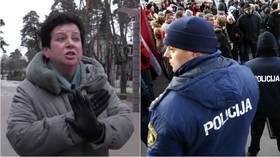In Latvia there is a campaign to DEHUMANIZE those working for Russian media, prosecuted journalist tells RT

With a campaign to “dehumanize” journalists, Latvia is sending a signal that freedom of speech and human rights do not belong to those who work with Russian media, Alla Berezovskaya, a prosecuted journalist, told RT.
As a freelance journalist, Berezovskaya has for years collaborated with Baltnews – a local private news portal founded by her colleague, veteran Latvian journalist Andrey Yakovlev. And she continued to do so after he transferred control of the outlet to Russian media group Rossiya Segodnya.
In late December, Latvia opened a case against seven journalists working for two Russia-linked outlets – Baltnews and Sputnik. Berezovskaya is one of them, facing charges over the supposed violation of EU sanctions.
The journalist could now face a fine, or even imprisonment, if found guilty.
Also on rt.com ‘An attempt to get rid of alternative opinions’: Latvian journalist tells RT about prosecution for working with Russian mediaLatvian authorities have “launched a real persecution campaign against journalists [working with] the Russian media,” Berezovskaya told RT.
“We are living in a free country and have a right to publish [our stories] wherever we deem necessary,” she said, adding that no authority had declared Baltnews’ activities illegal.
Riga maintains the journalists violated EU sanctions against Dmitry Kiselyov, the head of the Rossiya Segodnya media group. Kiselyov is under personal sanctions, but Latvia apparently sees it as a reason for a blanket ban on any cooperation with his media group.
The journalist also notes that the attitude towards anyone working with the Russian media in Latvia is quite hostile, both among the authorities and the media.
Not a single Latvian journalist said a word in our defense.
One local talk show simply brushed them off as “not journalists but Kremlin propagandists” in light of the charges, she said.
It is some sort of dehumanization. They want to … send a signal to the world that those who work for … the official Russian media are not journalists but propagandists, and thus [concepts of] democracy, freedom of speech, and human rights are not applicable to them.
Berezovskaya was surprised to be involved in sanctions that did not apply to her, adding that she had more than enough points of contention with the Latvian authorities. “I take a very stern stance when it comes to [closing] Russian-language schools in Latvia, non-citizens …,” the journalist said, referring to some of the government policies she opposes.
Despite having a sizable Russian-speaking minority, Latvian authorities have for years sought to make the national education system Latvian-language-only, facing staunch opposition from Russophones.
‘Non-citizen’ is a status given to mostly former Soviet citizens residing in Latvia when it gained independence from the USSR.
Also on rt.com ‘Flagrant attack on democracy’: Moscow blasts Baltic states for ‘persecuting’ journalists working for Russia-linked outlets‘Non-citizens’ have no other citizenship but still cannot enjoy full rights in Latvia, as since 1991 the status of a citizen there has been reserved for either ethnic Latvians and Livonians or those who received their education in Latvian. Now, more than 200,000 ‘non-citizens’ (accounting for 10 percent of the population) still cannot exercise a right to vote, among other things, since they have not gone through the “naturalization” procedure specifically reserved for them.
She also notes that Latvian politicians and public figures openly express their extremely xenophobic views on Russians, but that law enforcement simply turns a blind eye to such incidents. Back in 2017, a Latvian MP, Edvins Snore, called Russians “lice” that are really hard to get rid of in one of his articles.
Mans raksts šodienas NA avīzē. pic.twitter.com/EidrzOgtKn
— Edvīns Šnore (@EdvinsSnore) May 19, 2017
In another incident dating back to 2018, a now-late Latvian author, Didzis Sedlenieks, referred to Russians and Russian-speaking people as beings of the “lowest possible intellectual level,” who constitute “a genetic deviation from universal human norms.” “These beings have nothing of value, including human life,” he wrote in a Facebook post.
Yet, in both cases, Latvian law enforcement concluded that no crime had been committed, according to Berezovskaya, saying that there exists freedom of speech.
Also on rt.com Latvia wants to criminalize any contact with Moscow, activist prosecuted for penning articles for Russian media outlets tells RTThink your friends would be interested? Share this story!















